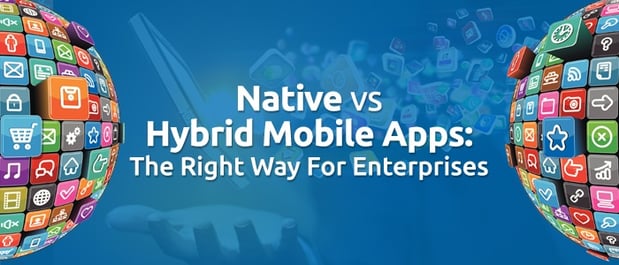
For the uninitiated, a native mobile application is a piece of software specifically designed for iOS, Android or Windows Mobile and a hybrid app is a mobile website packed into a ‘native’ wrapper.
A company that seeks to give its end users/customers a rich experience in navigation, look, performance, the debate stops right here – native apps is the way to go.
However, a hybrid app does come with its small but contextually meaningful advantages that can’t be looked over. Hybrid apps are usually written in HTML 5 and JavaScript and it takes the bare minimum of effort for a cross platform release of the app to multiple operating systems. If an enterprise is in a hurry to get a MVP out on a minimum budget – hybrid apps can be a possible solution. However, they should remember that, like all things, limited time and money will only get us sub-standard product and in this case – a night and day difference when it comes to performance.
Let’s take a look at more primary aspects where native and hybrid apps differ:
Device Support:
Native app development has inherent support for all devices, which are active in the market, and offers SDK level provisions to support lower end devices, which are outdated. Controlling features in mobile app based on device capabilities like GPS, camera, gyro sensors, are simple and easy.
For hybrid apps, support for low-end devices with limited sustenance for rich HTML based features will be a challenge. Provisioning support for all devices and controlling features based on devices require additional work and involves various third party libraries.
Response Time:
Native applications have very good response times and are limited only by the device specifications.
Hybrid apps also have good response times but only on the latest devices and will be sluggish on specific devices with low processing capabilities.
Development Cost:
The cost of building native apps will be considerably high due to minimal code reuse across platforms
For hybrid, the cost is moderate/low – based on code reuse across platforms.
Support and Maintenance:
Support for native apps will be low since SDK based device compatibility is handled by the platform
For hybrid apps, it ranges from moderate to high – specifically on scenarios where issues are device/platform specific and a patch fix can impact the application on other devices/platforms.
Offline support / Use of app without internet connectivity:
Native: Very high and SDK offers robust features to enable offline application use based on data caching
Hybrid: Limited support.
Usability / User Experience:
Native apps offer the best user experience when compared to hybrid because it is built within a mature ecosystem by following technical and user experience guidelines of the OS like – swipes, app defined gestures etc.
Hybrid apps permits a compromised user experience and to match a native mobile app user experience is a far stretch and involves lot of an impossible effort. This is the critical area of consideration because 92% of users will resort to a competitor’s app or stop using an app completely if the UX is unbearable.
If an enterprise has to go to the market immediately with a mobile app on a limited budget then a hybrid app can be a temporary solution.
If you need more consultation in choosing the right strategy, feel free to talk to us. 




